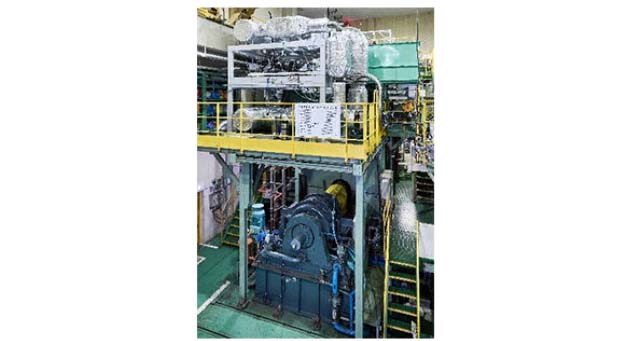Japan Engine Corporation (J-Eng) has begun testing ammonia fuel co-firing on a large two-stroke test engine, believed to be a world first.
Alongside this, J-Eng is carrying out trials of a hydrogen fuel injection device for a large low-speed two-stroke engine. The project is assisted by Japan’s Green Innovation Fund /Next-generation ship development project of New Energy and Industrial Technology Development Organization (NEDO).
The ammonia-fuelled test engine is installed at Mitsubishi Heavy Industries Research and Innovation Centre in Nagasaki. The test engine has been newly equipped with J-Eng’s stratified injection system technology. J-Eng will operate the test engine with ammonia fuel under various conditions over the next year.
A new facility to supply ammonia fuel to the test engine has been installed adjacent to the building where the test engine is sited, and the knowledge and the experience gained from the operation of this facility will be fed back to the development of ammonia fuel supply facilities on board ships.
In parallel, J-Eng aims to develop, design, and manufacture a full-scale ammonia-fuelled demonstration engine, scheduled to be completed in September 2025 after about six months of actual shop operation for verification.
The hydrogen fuel injection device, one of its key technologies, has been installed at J-Eng’s head office plant in Akashi city and operational tests have begun. J-Eng will use this equipment for more than one year to verify the design details of the injection system for hydrogen and accumulate basic data.
Following the tests, J-Eng will proceed with the development, design and manufacturing of a full-scaled hydrogen-fuelled demonstration engine, scheduled to be completed in March 2027 after about one year of actual shop operation for verification in 2026.
J-Eng says it will thoroughly verify the performance, quality and safety through the use of the ammonia fuelled test engine and the hydrogen fuel injection device, and will strive to develop next-generation engines which meet the needs of a good balance between economic and environmental performance. By bringing these next-generation engines to market at an early stage and promoting their widespread use, the company hopes to contribute to the development of the Japanese shipping and shipbuilding industries, while contributing to the reduction of GHG emissions in the shipping industry and the achievement of carbon neutrality by 2050.



